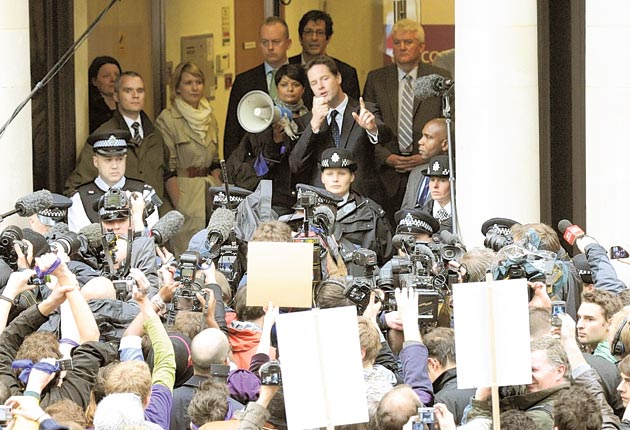Tories quick to come out against voting reform

David Cameron and Nick Clegg were hit by a rebellion yesterday over their plan to hold a referendum on the voting system next May on the same day as elections to the Scottish Parliament, Welsh assembly and English councils.
As the "Yes" and "No" camps geared up for multi-million pound campaigns on whether to scrap the first-past-the-post system, Conservative and Labour politicians warned that the "double vote" would be a recipe for chaos and called for the referendum to be delayed.
In Scotland, more than 100,000 votes were rejected amid confusion in 2007 when local authority and Scottish Parliament elections were held on the same day under different voting systems. The rules were changed to avoid a clash in future.
Mr Clegg will announce next week that a referendum on whether to switch to the Alternative Vote (AV) system, in which people list candidates in order of preference, will be held on 5 May next year. But the House of Lords constitution committee has warned against a "double vote" and the Electoral Commission has urged caution, saying it would examine such a proposal on a case-by-case basis.
Opponents of electoral reform accused the Liberal Democrats of demanding a same-day vote to boost the turnout in the referendum. Bernard Jenkin, a Tory MP who will campaign to keep the present system, said he was "astonished".
The Yes and No camps will each receive £600,000 of taxpayers' money. They will be allowed to spend up to £5m.
However, the No campaign may enjoy a bigger budget. Lord Leach, a Tory peer, will raise funds and is likely to win support from businessmen who also backed a campaign against joining the euro for a referendum that did not eventually took place after Tony Blair backed away from holding it.
Some officials involved in the European campaign will return to oppose changing the voting system. They include James Frayne, who also ran a successful drive against a North-east regional assembly in a 2004 referendum, and George Eustice, elected as Tory MP for Camborne and Redruth in May. "The abominable No men are back," one Labour frontbencher said yesterday.
Other Tory MPs who will oppose reform include David Davis, the former shadow Home Secretary; Daniel Kawczynski, chairman of the all-party First Past the Post group, and Gavin Barwell, a former aide to Lord Ashcroft, the ex-Tory deputy chairman. Lord Ashcroft will not fund the No group, sources insisted yesterday.
Labour supporters of the current system will also play a prominent role in the No blitz. They include Labour MPs Ian Davidson, Sir Stuart Bell and Kelvin Hopkins. The No brigade hope to persuade John Prescott, the former Deputy Prime Minister, to join them.
In an attempt to enthuse the public, both sides will aim to recruit celebrities. "It cannot just be about boring politicians," one AV supporter admitted. Battle will commence during this autumn's party conferences, with the formal campaign starting next year.
Mr Clegg is bound to be the front man for the Yes camp. He will offer the public a "once-in-a-generation opportunity" to reform a discredited voting system. He will not want it to look like a single-party issue designed to boost the electoral prospects of the Liberal Democrats. He will have plenty of support from a range of pressure groups who advocate reform – even if, like his party, they regard AV as only a first step towards proportional representation.
Mr Clegg is unlikely to be able to recruit David Cameron. Downing Street said yesterday that he would campaign for a No vote. Although it refused to say that a Yes vote would ensure the next general election is fought under AV, Mr Cameron is believed to accept that.
The Yes camp may scramble together a handful of Tories who support reform, but most will join the No camp. Labour backed AV at the May election after Gordon Brown's conversion to it but is now split down the middle.
Jack Straw, the shadow Justice Secretary, warned yesterday that there might not be a consensus since the Tories had linked the AV vote to a plan to equalise the size of constituencies – a move that would cost Labour between 20 and 30 Commons seats.
Mr Clegg hopes his trump card may be the very existence of the coalition, which will make it hard for the No camp to argue that AV would result in hung parliaments and unstable coalitions.
Subscribe to Independent Premium to bookmark this article
Want to bookmark your favourite articles and stories to read or reference later? Start your Independent Premium subscription today.

Join our commenting forum
Join thought-provoking conversations, follow other Independent readers and see their replies